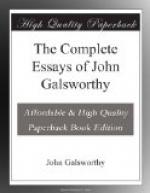But even as he did so a gleam of light, like a faint moonbeam, stole out into the garden of his despair. “Is it possible,” he thought, “that, by a writer, until his play has been performed (when, alas! it is too late), ‘the Public’ is inconceivable—in fact that for him there is no such thing? But if there be no such thing, I cannot exist to give it what it wants. What then is the reason of my existence? Am I but a windlestraw?” And wearied out with his perplexity, he fell into a doze. And while he dozed he dreamed that he saw the figure of a woman standing in darkness, from whose face and form came a misty refulgence, such as steals out into the dusk from white campion flowers along summer hedgerows. She was holding her pale hands before her, wide apart, with the palms turned down, quivering as might doves about to settle; and for all it was so dark, her grey eyes were visible-full of light, with black rims round the irises. To gaze at those eyes was almost painful; for though they were beautiful, they seemed to see right through his soul, to pass him by, as though on a far discovering voyage, and forbidden to rest.
The dreamer spoke to her: “Who are you, standing there in the darkness with those eyes that I can hardly bear to look at? Who are you?”
And the woman answered: “Friend, I am your Conscience; I am the Truth as best it may be seen by you. I am she whom you exist to serve.” With those words she vanished, and the writer woke. A boy was standing before him with the evening papers.
To cover his confusion at being caught asleep he purchased one and began to read a leading article. It commenced with these words: “There are certain playwrights taking themselves very seriously; might we suggest to them that they are in danger of becoming ridiculous . . . .”
The writer let fall his hand, and the paper fluttered to the ground. “The Public,” he thought, “I am not able to take seriously, because I cannot conceive what it may be; myself, my conscience, I am told I must not take seriously, or I become ridiculous. Yes, I am indeed lost!”
And with a feeling of elation, as of a straw blown on every wind, he arose. 1910.
STUDIES AND ESSAYS
By John Galsworthy
“Je vous dirai que
l’exces est toujours un mal.”
—Anatole
France
Table of contents:
About
censorship
vague
thoughts on art
ABOUT CENSORSHIP
Since, time and again, it has been proved, in this country of free institutions, that the great majority of our fellow-countrymen consider the only Censorship that now obtains amongst us, namely the Censorship of Plays, a bulwark for the preservation of their comfort and sensibility against the spiritual researches and speculations of bolder and too active spirits—it has become time to consider whether we should not seriously extend a principle, so grateful to the majority, to all our institutions.




